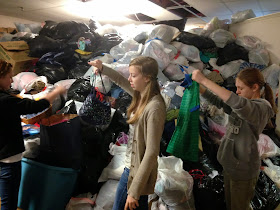Parents will have said some version of it 532 times each week before a kid leaves for college: Take responsibility! Don't blame me that you overslept/forgot the test/ran out of gas/etc.! Prioritize! Don't make excuses!
Be responsible!
In high school, teachers/parents assume a lot of responsibility for students as far as keeping up with homework, knowing deadlines, getting kids where they need to be on time. Your student is probably not even be aware of the part you play behind the scenes.
But in college, it’s flipped. The professor is responsible for being there, grading material, and providing information. Everything else is up to the student: coming to class, turning things in on time, making up missed work, keeping up with assignments.
Dr. M., one of our faculty panelists in the "What College Profs Wish Freshmen Knew" roundtable, stressed that good time management is the key to being a responsible student. First of all, he said, use that syllabus, as discussed in a previous post in this series: "When you get your syllabus from class, open your planner, and write down your work schedule, write when things are due ahead of time, manage your time. Professors will not remind you when your assignment is due; it’s in the syllabus."
Dr. O. emphasized the need to "plan your time, or the world will plan for you." All the faculty members were passionate about not wasting time—about actually scheduling free time into your day so that the day isn't wasted with just one more game on an electronic device "to relax" or 15 more minutes on Facebook.
Some of their suggestions included:
- Plan your downtime. Rest and relaxation is important, but too much can turn into wasted time.
- Make to-do lists. Make them for each day, and make them for 10 weeks out.
- Prioritize what needs to be done and how much time each task will take. If you have to choose something that doesn't get done, choose that something that will come back to bite you the least.
- Distribute your time. Whether you are planning by 30 minute slots or by task, make sure you have a plan. If you don't have your plan laid out, you will lose 30 percent of your time trying to figure out what to do in the half-hour you have.
- Don't be discouraged. You probably won't have everything done at the end of the day. Remember that your list is your slave—you are not a slave to your list.
We'll discuss interaction with professors in another post, but it is of utmost importance to stress that personal responsibility and interaction with professors are intertwined. Students who show a lack of responsibility show a lack of respect and desire to learn. Students should be on time to class and should be organized and prepared. (As our Scoutmaster says, "If you're not 5 minutes early, you're late.") Students should be polite and not sullen, as if somehow they are doing a favor to the professor for being present. Students will have a much better chance at success if they act like respectful adults rather than entitled teenagers who "deserve" to be in college.
It is each student's responsibility to find out from the first day what each professor's expectations are, and respect those rules. (Again, read that syllabus to find out the rules.) Dr. M., for example, has a strict no-cell-phone policy. "In my classes," he explained, "if your cell phone goes off, you get kicked out. And you will get an automatic zero if it goes off during an exam." Saying "I didn't know!" shows a total lack of personal responsibility.
College isn't all about academics. It's also a time for personal growth and discovery, for social development and finding one's place in the world. But academics should be far and above the top priority. Students who repeatedly choose parties over papers and video games over textbooks might be in for a rude awakening at the end of the semester.
What these faculty members want you to know?
Be responsible. Manage your time. Set goals. Prioritize. Work really, really hard, and reward yourself with a little play.
This is #3 in the series: "What College Profs Wish Freshmen Knew." See also:
#1: Write Well.
#2. Read the Syllabus.
#4. How to Interact with Professors.
#5. Study.
#6. Get Involved































